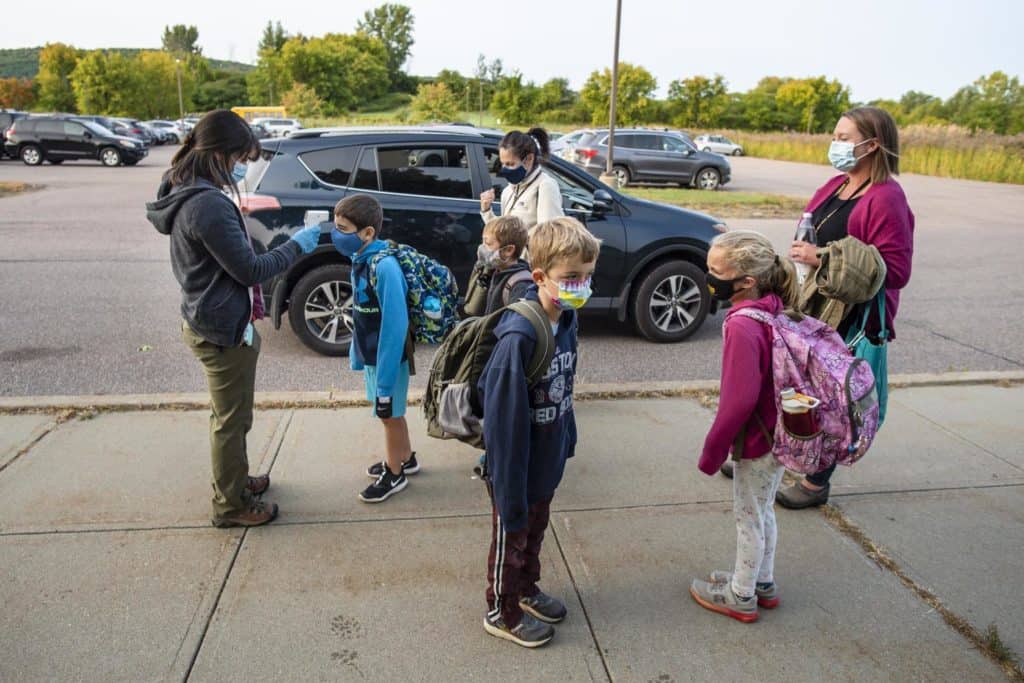
By Lola Duffort/VTDigger
Amanda Durand’s 3-year-old daughter was at child care for about an hour in September when a center worker called to say she had to go home. The toddler had a runny nose and “one green booger,” the West Rutland mom recalled.
“I got lucky. I work from home, so I was able to even keep my kiddo at home and still get a fraction of my work done. But some parents don’t have that,” Durand said.
The lengthy checklist of symptoms that state guidelines require that schools and child care centers use to screen children amid the pandemic has emerged as a point of contention for many parents, many of whom say it is unrealistic to keep kids home with symptoms that overlap with allergies and the common cold, including runny noses.
Durand, for her part, is sympathetic. A case manager at the Southwestern Vermont Council on Aging, she said
she’s supposed to stay clear of in-person work if she has even mild symptoms.
“I mean — I get it, I completely get it. But it just makes it hard, especially with 3-year-olds who have allergies, and colds, and teething and meltdowns,” she said.
In Essex, Growing With Wonder child care center director Dawn Irwin said she and her staff decided a strict ban on runny noses was untenable. So, in consultation with staff from the Department of Health, Irwin said her center came up with a way to triage mucus. A clear runny nose that needs to be wiped only five times or fewer in half an hour can stay. The rest go.
“If it’s discolored, or like really goopy, that’s the kind of runny nose that we just say, ‘Nope, you can’t be here today’,” Irwin said.
Sierra Metcalf, a teacher at the Seed Sprout Bloom center in Berlin, said child care workers dread making the call to parents, who are more often frustrated than understanding.
‘Some parents cry … some are rude’
“Some parents cry because they get so stressed out because they just got back to work,” Metcalf said. “Some of them are really rude about it. Like, ‘this is ridiculous, these are runny noses.’ It puts a strain on us, because we feel horrible about it.”
The center also lets snot-nosed children stay so long as the mucus is clear and does not run freely. But too many still get sent home, Metcalf said, and state officials have been thus far unwilling to offer further leniency. Employees tell parents they have little say in the matter, she said, and encourage them to call the state directly to register their complaints.
Jay Nichols, executive director of the Vermont Principals’ Association, said he’s increasingly hearing about this from schools and parents.
“If you’re only going to school a couple of days a week, for example, and you miss one of those days because you have a little bit runny nose, you’ll find that it’s really very unfortunate. The problem is with this disease — it’s really hard to tell. So we’re gonna err on the side of safety,” he said.
Vermont is not alone in wrestling with this problem. In Canada, British Columbia has gone so far as to remove cold symptoms entirely from its student health checklist, and Ontario just relaxed its own screening protocols.
Vermont needs to watch the real-world impacts of its guidelines, said Ben Lee, an associate professor of pediatrics at the University of Vermont and pediatric infectious disease specialist at UVM’s Children’s Hospital.
But for now, Lee said he favors a more cautious approach, and said the current guidelines have the added benefit of lessening the transmission of other illnesses that usually spread rampantly in school and child care settings.
“Having a flu outbreak in a school or having an outbreak of another respiratory virus could, in the era of Covid … place enormous burdens on schools and families and providers as well,” he said.
Vigilance is crucial now
The Vermont Health Department does not anticipate removing runny noses from its symptom list, according to agency spokesperson Ben Truman. But it is working on providing “additional guidance on when runny noses should/should not be excluded from school,” he said, which should be released around mid-October.
Truman said the current guidance allows for students with no fever and allergy symptoms that cause coughing and clear runny nose to attend in-person, if they have medically diagnosed allergies and follow treatment plans.
Sophia Hall, president of the Vermont State School Nurses Association, said she’d rather not see screening protocols relaxed. If the state has escaped the worst of the pandemic, she said, it’s because it’s been vigilant about mitigation measures.
She agrees a clear runny nose is less concerning than one that’s discolored and congested, and particularly one that’s accompanied by other symptoms. But she said she’d still send a kid home and then do some fact-finding to assess how quickly they could come back to class.
“I have had parents tell me, ‘It’s just a cold, it’s just allergies.’ You know, all you can do is try to try to help them understand that this is a pandemic, and we have to do things differently,” she said.




